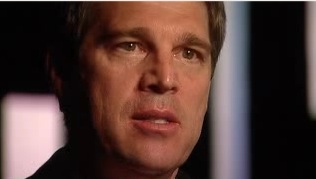David Brandon on leadership.

David Brandon is CEO of Domino’s Pizza. He’s one of the contributors to the 50 Lessons website. This website incorporates is a series of 4-minute videos from inspirational leaders of organizations. Brandon was a successful American Football player at college, an experience he looks back to often when thinking about leadership issues.
The following is what I took away from viewing his five videos on the 50 Lessons website:
Treat people the way they want to be treated
Leaders need to be able to adapt the way they deal with people to individual circumstances. The wrong approach is to take the same leadership style and apply it to all your dealings with staff in your organization. Find out the way people want to be treated and treat them that way. Brandon says this is the best piece of advice his father (who himself had no formal leadership experience) gave him early in his career.
Have a plan for ‘sudden change’

- Image via Wikipedia
Looking back to his college American Football days, Brandon talks about how his coaches trained the team to recognise sudden change within a game and to respond to it in a positive way. Transferring this to organizations, it’s importance to instill the idea that ‘change is good’ whilst recognizing that many will approach it will trepidation and indeed may resist that change.
Brandon talks about when he was unveiled as CEO of Domino’s Pizza and kept his message simple. He contrasted ‘sitting around talking about the good old days’ with embracing change to make a good organization even better.
Things either get better or they get worse

- Image via Wikipedia
Brandon’s comments on things ‘never staying the same’ reminded me of a saying I had on my wall in my old classroom, attributed to Oliver Cromwell. It read, ‘He who stops being better stops being good.’ It’s a phrase I saw every day and spurred me on.
Brandon believes that when things are going well for an organization or team – sales are up, the team is winning every game, academic results are getting better every year – then it’s easy to fall into the mindset of ‘just turning up.’ To counter this, he says, coaches when he played American Football drummed into them the belief that ‘things either get better or they get worse, but things never stay the same.’ Fostering this mentality in your organization leads to constant striving towards improvement.
Don’t rely on internal benchmarks
It’s all very well hitting or even surpassing benchmarks and targets set internally within your organization. However, if no attention is paid to others in the field, then you can be left behind. Brandon talks about finding the best in the field and becoming as good or better than them.
With schools, this is less of an issue of competition and more one of keeping up with best practice, I believe. Of course, there’s local competition in terms of persuading parents to send their children to your school, but in the bigger picture it’s about raising standards across the board.
Deal with minor issues quickly
The time to deal with minor issues is as quickly as you can and when things are going well. Restructuring, procedural issues and suchlike are much better done at times of stability rather than when your organization is on ‘the edge of a cliff’. Making changes when things are going well means the organization is more resilient and can be more focused on those changes rather than on the survival of the organization.
Pivotal moments & decision-making
As a leader there will be ‘pivotal moments’ when going one way could lead to great rewards, whereas going the other way could lead to disastrous consequences. It’s the easiest thing in the world to make a decision when you and 100% of the people around you agree on what should be done. The tough decisions come when there is a 50/50 split.
When such a decision has to be made, make it and then act with ‘confidence, passion and a true sense of calm.’ Leaders, after all, must lead. Your actions after the decision has been taken are almost more important than the decision itself as you can energise the workforce into taking action for the organization to succeed. You need to explain your decisions and then stand by them.
PS You can get access to the 50 Lessons website through the National College for School Leadership’s Leadership Library

![Reblog this post [with Zemanta]](http://img.zemanta.com/reblog_e.png?x-id=6157f082-2d52-4c39-8c32-b8e4a3ca7c4f)